SEJARAH PERADABAN DAN MASA DEPAN KESADARAN MANUSIA PADA POSISI ONTOLOGIS KECERDASAN BUATAN (ARTIFICIAL INTELLIGENCE) DALAM PERSPEKTIF ALQURAN
(Kajian Tafsir Ayat-Ayat Filosofis)
DOI:
https://doi.org/10.47498/bashair.v3i1.2030Keywords:
Artificial Intelligence (AI), Qur'an, Onthology, The History of CivilizationAbstract
Artificial intelligence (AI) can now be found easily in various aspects of human life ranging from computer programs, vehicles and devices. This for some people is quite worrying, but there are also those who consider it as an advance of civilization. AI, which initially only revolved around industrial technological advances, now doubles as part of ontological discussions, especially themes of consciousness. The intelligence possessed by AI in simulating is undoubted, especially with the existence of chatbots and algorithms. However, since its inception, AI has always been faced with the concept of consciousness. Consciousness is an abstract thing, because it is believed to be possessed only by humans. AI itself is considered to have a large content in human civilization and the future history of human civilization. In the verses of the Qur'an, human life is not a simulation, and consciousness is immaterial, and cannot be captured by science. Thus, AI can only be positioned as an instrument, which cannot achieve the status of having consciousness ontologically. AI is not value-free, technology in history has often been used to oppress humans and AI is considered potentially a disaster for humanity. This research is sourced from the literature study approach in finding data related to technological advances and the responses that surround them. This research is expected to be able to contribute new knowledge in terms of Quranic studies, history, technology and science.
References
Amrizal, V., & Aini, Q. (2013). Artificial Intellegence. Jakarta Barat: Halaman Moeka
Publishing. BBC, N. (Director). (2023). AI “godfather” quits Google over dangers of Artificial Intelligence. Retrieved from https://www.youtube.com/watch?v=DsBGaHywRhs
Bibel, W. (2014). Artificial Intelligence in a Historical Perspective. AI Communications, 27(1), 87– 102.
Dahria, M. (2008). Kecerdasan Buatan (Artificial Intelligence). Jurnal Saintikom, 5(2), 185–197. Diamond, J. (2019). Guns Germs & Steel (Rangkuman Riwayat Masyarakat Manusia). Jakarta Pusat: Penerbit KPG.
Frank, L., & Nyholm, S. (2017). Robot Sex and Consent: Is Consent to Sex Between a Robot and
a Human Conceivable, Possible, and Desirable? Artificial Intelligence and Law, 25(3), 305– 323.
Garcia, D. (2015). Killer robots: Why the US Should Lead The Ban. Global Policy Journal, 6(1), 57–63.
George Murdock, P. (1965). Culture and Society. USA: University of Pittsburgh Press.
Hadi, Abdul WM. (2001). Tasawuf yang Tertindas: Kajian Hermeunetika terhadap Karya-karya Ḥamzah Fansûrî. Jakarta: Paramadina.
Mutahhari, M. (1986). Spiritual Discourses (Arabic and English Edition). US: Al-Buraq.
Nichols, G. P. (2017). The Future of Destruction: Artificial Intelligence. HDIAC Journal, 5(2), 42– 48.
Pizzetti, F. G. (2019). The Robot Sophia as a “new citizen” of Saudi Arabia: What about granting legal personhood, “citizenship” and eventually dignity to non-human entities with artificial intelligence? Notizie Di Politeia, 35(133), 63–70.
Russel, S. J., & Norvig, P. (2016). Artificial Intelligence: A Modern Approach. Kuala Lumpur: Pearson Education.
Schimmel, A. (1994). Deciphering the Signs of God. New York: State University of New York Press.
Zed, M. (2004). Metode Penelitian Kepustakaan. Jakarta: Yayasan Obor Indonesia.
Downloads
Published
Issue
Section
License
Authors who publish articles in Basha'ir: Jurnal Studi Al-Qur'an & Tafsir agree to the following conditions:
- The author retains copyright and grants the Basha'ir Journal the right from the first publication with the work simultaneously licensed under a Creative Commons Attribution-ShareAlike 4.0 International (CC BY-SA 4.0) license that allows others to make changes, adjust and build on the work with recognition of the author's work and initial publication in the Journal.
- Authors are allowed to copy and redistribute published versions of works in journals (for example, posting them to institutional repositories or publishing them in a book), with recognition of their initial publication in Basha'ir: Jurnal Studi Al-Qur'an & Tafsir.
- Authors are allowed and encouraged to post their work online (for example, in institutional repositories or on their websites) before and during the submission process, as it can lead to productive exchanges, and increase citations of published works






